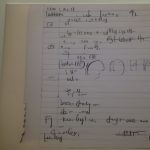14 Tips to Fit in Studying for the Busy High School Student

As a high school student, you are probably juggling a lot of activities- from classes and homework to sports and clubs. It can be tough to find time to fit in studying, too. But don’t worry – there are plenty of techniques that can help you make the most of your limited study time. Here are 14 of the best:
1. Make a realistic schedule:
It can be tempting to cram in lots of study sessions, but it’s important that you don’t overdo it and burn out. Create a schedule that allows for plenty of breaks and free time so you can stay well-rested.
A good schedule for a busy high school student would involve dividing study time into small chunks and including breaks between each session. This way, you can stay focused while you study and avoid feeling overwhelmed. Of course, you will have to get a feel for your day as well.

If you have a lot going on in the later parts of the day, then you might want to find some time earlier to focus on your studies. Otherwise, you may not feel like doing anything when you get home at night.
2. Set small goals:
Break up your studying into smaller, manageable chunks. It can be easier to stay motivated when you’re focused on achieving a specific goal than when you’re trying to tackle an entire semester of material all at once.
Some examples of how to break a large goal into smaller goals include:
– Studying for one hour instead of four
– Completing five problem sets instead of twenty
– Rewriting your notes rather than trying to learn them by heart
3. Take notes:
Taking down key points while reading or listening in class can be a helpful way to review the material later. This can be especially useful when studying for tests and exams.
There are a few different techniques that can help when taking notes. The best method will vary depending on the individual and the subject matter. However, some tips that can be helpful for most students include:
– Writing down the main points from lectures or readings
– Breaking down complex concepts into smaller, more manageable parts
– Drawing diagrams or illustrations to help represent ideas
– Taking notes in a separate notebook or journal specifically for studying
4. Practice tests:
Practice tests can be a great way to assess your understanding of the material and identify any areas that you need to focus on more. They can also help you get used to the format of exams and test questions.
If your school offers practice tests, make sure to take advantage of them! If they don’t, there are plenty of online resources that you can use. Just be sure to time yourself so that you get an idea of how long it usually takes you to complete a test.
5. Create a study group:
Studying with others can be a great way to share ideas and help each other out. It can also make the process more fun and social. If possible, try to find a group of people who are taking the same class as you.
6. Use flashcards:
Flashcards are a tried-and-true study tool that can be helpful for a variety of subjects. They allow you to quickly review key concepts and definitions by testing yourself on them. You can either make your own flashcards or find them online.
7. Take breaks:
It’s important to take breaks when you’re studying, especially if you’re trying to focus on a lengthy task. Get up and move around every once in a while, or just take some time to relax and clear your mind. This will help you stay productive and focused when you return to your work. Studying for long periods of time can be mentally and physically exhausting. Taking breaks allows you to recharge and come back to your work with fresh energy. It’s also a good way to avoid feeling overwhelmed or stressed.
When you take short breaks (5-10 minutes), you can usually get right back into what you were doing without losing too much focus. However, if you take longer breaks (30 minutes or more), you may find that it takes a while to get back into the swing of things.
8. Eat healthily:
Your brain needs food to function properly, especially when you’re studying hard. Make sure to eat plenty of fruits, vegetables, and whole grains. Also, avoid eating processed foods and excessive amounts of sugar.
9. Get enough sleep:
If you’re not well-rested, it will be difficult to focus on your studies. Most people need around 8 hours of sleep per night in order to feel rested and energized the next day.
10. Listen to music:
Some students find that listening to music while they study helps them focus better. If this works for you, choose songs without lyrics so that you can still listen to the words without getting distracted.
Music can help students focus by providing background noise that is not too distracting. It can also help to keep students relaxed and motivated, which can make it easier to stay focused.
11. Get better organized:
Keeping all of your materials organized can help reduce stress and make studying easier. Make sure everything has its own place – including textbooks, notebooks, highlighters, etc – so you don’t have to waste time looking for things when you need them.
There are a number of different organizational systems that high school students can use to make studying easier. Some of the most popular ones include:
- The Cornell method: This system involves taking notes in a specific way during class so that you can review them later. The main idea is to focus on recording the main points and ideas rather than trying to write down every word. You can then use these notes to create flashcards or outlines for further study.
- The Pomodoro technique: This system involves breaking down studying into short, 25-minute blocks with five-minute breaks in between. This can help you stay focused and motivated during your study sessions.
- The 4-4-8 rule: This system recommends studying for four hours on four consecutive days each week, with eight hours of break time in between. This schedule allows for plenty of time for other activities and can be a helpful way to avoid burnout.
Each of these systems has its own benefits and drawbacks, so it’s important to find one that works best for you. Try out a few different methods and see which one helps you learn and retain information the best.
12. Doodle:
It might seem counterintuitive, but doodling can actually be beneficial while studying – it can help you focus and stay alert by stimulating your brain’s creative side.
Doodling helps to stimulate the brain’s creative side by forcing you to focus on one task at a time. When you’re doodling, you can’t think about anything else, which allows your brain to focus on the task at hand. Doodling can also help you come up with new ideas by stimulating your creativity.
13. Get comfortable:
Your studying space should be comfortable and free of distractions so you can focus. Find a place that works for you, whether it’s your bedroom or the library – whatever helps you concentrate best.
It can be tempting to study in bed or on the couch, but it’s important that you find a dedicated space where you can really focus. Some of the best places to study include libraries, coffee shops, and quiet spaces in your home or school.
By creating a designated study area, you will avoid distractions that detour you from studying. You’ll also give your brain a comfortable place to do its thing.
14. Reward yourself:
Don’t forget to reward yourself for your hard work! Give yourself a break after completing an assignment or studying for an hour to help you stay motivated.
Some good rewards for studying include taking a break to watch your favorite show, going for a walk, or eating your favorite snack. You could also reward yourself with something bigger, like a day at the spa or a weekend away. Just be sure to set some limits so that you don’t get overwhelmed.
Whatever you choose, make sure it’s something that you really want and will help you stay motivated.
Make It Easier to Fit in Studying With These 14 Tips
Following these 14 tips can help make sure that you get the most out of your limited study time and ace those exams. It can also help you better cope with the mental health stressors that are only natural for this time in your life. Best of luck as you navigate the end of your semester.
Are there any study tips or ways that you have learned how to fit in studying that you’d like to share with the rest of the class? By all means, do! Share in the comments section below.
[Featured Image Original]








